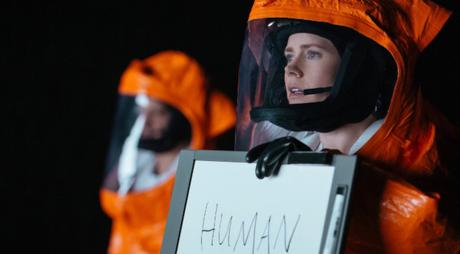
Review: In Arrival, 12 extraterrestrial saucers mysteriously appear and float above 12 different places around the Earth. Clueless of what they may encounter, humanity quickly falls into fears and turmoil. A linguistic professor, Dr. Louise Banks (Amy Adams) is summoned into an alien site nearby to decipher the alien's alleged language, to prevent mass hysteria that might lead to a war of the world.
David Villeneuve, director of acclaimed grim thrillers (from Incendies to Sicario), picks up where other 'first-contact' predecessors (i.e., The Day the Earth Stood Still or Independence Day) have established and neutralizes it, making it more ambiguous in terms of the hazard. Arrival is presented as a new non-patronizing and non-preachy cerebral sci-fi detailing an mind-bending approach to allegedly alien invasion.
The titular arrival comes swiftly as the film begins as those mysterious spacecrafts hover around random points of the globe. Elusively, those spacecrafts do not make initial contact: not a threat and not any 'greeting.' Those extraterrestrial beings allow human to board on the saucer every specific period of time and witness their seven-legged form hence their name 'heptapod.' There's no sign of invasion or any hostility, but humanity, fearing what they don't understand, is full of suspicion and is naturally defensive.
In this sense, Dr. Banks' role is salient. With assistance of scientist, Ian Donelly (Jeremy Renner) and Colonel Weber (Forest Whitaker), Dr. Banks, who occasionally gets several episodic, collection of memory about her deceased daughter, brings humanity to the unthinkable. Humanity does what Hollywood never attempts to do previously: communicating, more importantly, interacting. Therefore, making use of 'language' as the core of Arrival is a bold, groundbreaking innovation. At some points, Arrival points out that communication is a humanity's ultimate weapon (or tool), which often is neglected, not optimized, leading to prolonged, unnecessary conflict.
There are some nods to advanced sci-fi, but Villeneuve does not fuss over to complicate things, the film focuses more on the linguistic side as a key of communication. At some points, it nudges over the study of semantics and semiotics, but, most of the time, it grounds on the basic constraint, fundamental construct that language is arbitrary; meaning to say that the sound/form doesn't naturally connect with meaning. This construct enables Arrival to dive further into deciphering the message.
At one point, Arrival also nudges about Bruner's idea that language is a constitutive of reality. Meaning to say that reality might differ from each other due to the way ones understand the language. The film brings this construct into surface, keeps the connection between language and science in tact, and presents it into a moving story mildly but vividly.
The first two third of Arrival, crawling with purposely slow pace, digs into the nature of communication in attempts to understand the purpose of the extraterrestrial visit. The communication quest expands with enthralling chapters: between humanity and the alien at surface, and, at deeper consequence, among humanity, among countries. As biggest reveal subtly unravels, Arrival turns into an eye-opening, profound realization that the communication might lead to a new understanding about time and, surprisingly, love; but it all leads to consequences, unraveling the film's biggest, well-concealed theme: acceptance.
This acceptance theme makes it a deeply human film disguising as an alien film. It puzzles and baffles the audiences, lets ones drowning to decipher a puzzle, only to lead to a realization that the only way in is the only way out, which is: to embrace the whole event (or what's coming) as it is.
As much as it is a moving story, Arrival is crafted out with beauty-a harmony between tantalizing cinematography full of natural light and symmetrical shots by DoP Bradford Young with enigmatic scoring by Johan Johansson. That idyll cued by Max Richter's On the Nature of Daylight (the same song used in Shutter Island) in the beginning and ending helps you get through a palindrome of a story-a continuum, an order which can be seen forward from beginning or backward from the end respectively.
Arrival is an elegantly eloquent.
Arrival (2016)


Drama, Mystery, Sci-Fi Directed by:
